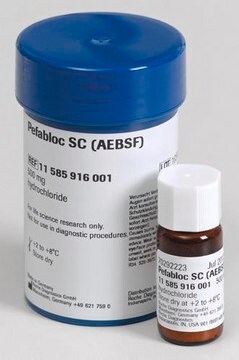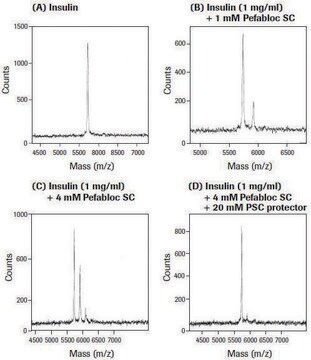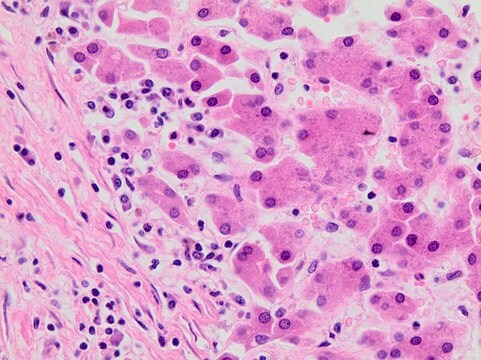11873628001
Roche
Pefabloc® SC PLUS
solution, suitable for electrophoresis, solubility: 0.1 M in water, soluble, pkg of 2 × 25 mL (1 g)
Synonym(s):
PSC-protector, serine protease inhibitor
Sign Into View Organizational & Contract Pricing
All Photos(2)
About This Item
UNSPSC Code:
12352204
Recommended Products
form
solution
mol wt
239.5
packaging
pkg of 2 × 25 mL (1 g)
manufacturer/tradename
Roche
concentration
0.1-1.0 mg/mL
technique(s)
electrophoresis: suitable
mp
175-185 °C
solubility
water: soluble 0.1 M
storage temp.
2-8°C
Related Categories
General description
Set consists of Pefabloc® SC and the corresponding amount of PLUS additive to avoid covalent attachment of Pefabloc® SC to proteins when used in higher concentrations and extended incubation times at an alkaline pH. Choose Pefabloc® SC for all applications where the general inhibition of serine proteases is desired. With its high stability and irreversible inhibition mechanism, Pefabloc® SC protects proteins throughout procedures such as:
Use Pefabloc® SC to inactivate proteinase K, for example, during pulsed-field gel electrophoresis (PFGE). With this technique, isolating the genomic DNA requires proteinase K to degrade cellular components, and this highly resilient protease is difficult to inactivate. Pefabloc® SC inhibits proteinase K, and protects the stability of restriction enzymes used for further DNA analysis.
- Extraction processes (from animal tissues or cells, plants, bacteria, yeast, and fungi)
- Subsequent purification steps
- Varied sample storage conditions
- Downstream protein detection (e.g., western blotting, reporter gene analysis, etc.)
- Biochemical studies where proteins are required.
Use Pefabloc® SC to inactivate proteinase K, for example, during pulsed-field gel electrophoresis (PFGE). With this technique, isolating the genomic DNA requires proteinase K to degrade cellular components, and this highly resilient protease is difficult to inactivate. Pefabloc® SC inhibits proteinase K, and protects the stability of restriction enzymes used for further DNA analysis.
The Pefabloc® SC PLUS set combines the serine protease inhibitor Pefabloc® SC with a uniquely formulated Pefabloc® SC protector (PSC-Protector), adding additional convenience and reliability to the safe, stable protease inhibition provided by Pefabloc® SC .
Recent findings indicate that sulfonyl-type serine protease inhibitors such as Pefabloc® SC and PMSF can bind covalently to proteins. This can occur when the inhibitors are used in high concentrations, or during extended incubation times under alkaline conditions. This interaction adversely affects the tyrosine and lysine residues of a protein, as well as the free amino terminus. The PLUS additive (PSC-Protector) included with this set prevents covalent attachment of Pefabloc® SC to proteins when used in higher concentrations and extended incubation times at an alkaline pH.
Recent findings indicate that sulfonyl-type serine protease inhibitors such as Pefabloc® SC and PMSF can bind covalently to proteins. This can occur when the inhibitors are used in high concentrations, or during extended incubation times under alkaline conditions. This interaction adversely affects the tyrosine and lysine residues of a protein, as well as the free amino terminus. The PLUS additive (PSC-Protector) included with this set prevents covalent attachment of Pefabloc® SC to proteins when used in higher concentrations and extended incubation times at an alkaline pH.
Specificity
Specific, potent, and irreversible inhibitor of serine proteases. The inhibitory activity of Pefabloc® SC is comparable to PMSF or DFP; however, Pefabloc® SC is non-toxic. Specifically inhibits serine proteases and prevents nonspecific covalent modification of proteins as tested by mass spectrometry.
Features and Benefits
- Take advantage of a simplified two-reagent system. Use the PSC-Protector solution to prevent covalent binding between proteins and Pefabloc® SC, even at high concentrations, extended incubation times, and at alkaline pH (see Figure 1 and Figure 2).
- Benefit from an easy-to-use inhibitor. Add water-soluble Pefabloc® SC directly to aqueous buffers.
- Avoid hazardous compounds. Obtain non-toxic protease inhibition without risk to you, or those around you.
- Ensure protection with improved stability. Achieve consistent protease inhibition even at pH levels above 7.0 and temperatures above +4°C.
- Maximize inhibition. Be certain that your levels of active inhibitor are high enough by using a product that is reliably soluble and stable.
Packaging
Set consists of Pefabloc® SC and the corresponding amount of PLUS additive to avoid covalent attachment of Pefabloc® SC to proteins when used in higher concentrations and extended incubation times at an alkaline pH. Choose Pefabloc® SC for all applications where the general inhibition of serine proteases is desired. With its high stability and irreversible inhibition mechanism, Pefabloc® SC protects proteins throughout procedures such as:
- Extraction processes (from animal tissues or cells, plants, bacteria, yeast, and fungi)
- Subsequent purification steps
- Varied sample storage conditions
- Downstream protein detection (e.g., western blotting, reporter gene analysis, etc.)
- Biochemical studies where proteins are required.
Set containing two components
Other Notes
For life science research only. Not for use in diagnostic procedures.
Legal Information
Pefabloc is a registered trademark of Pentapharm
Kit Components Only
Product No.
Description
- Pefabloc SC, 1 g
- PSC-Protector solution, 2 x 25 mL ready-to-use
Signal Word
Danger
Hazard Statements
Hazard Classifications
Eye Dam. 1 - Flam. Liq. 3 - Skin Corr. 1B
Storage Class Code
3 - Flammable liquids
WGK
WGK 1
Certificates of Analysis (COA)
Search for Certificates of Analysis (COA) by entering the products Lot/Batch Number. Lot and Batch Numbers can be found on a product’s label following the words ‘Lot’ or ‘Batch’.
Already Own This Product?
Find documentation for the products that you have recently purchased in the Document Library.
Our team of scientists has experience in all areas of research including Life Science, Material Science, Chemical Synthesis, Chromatography, Analytical and many others.
Contact Technical Service










